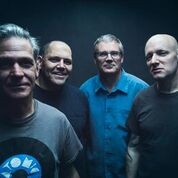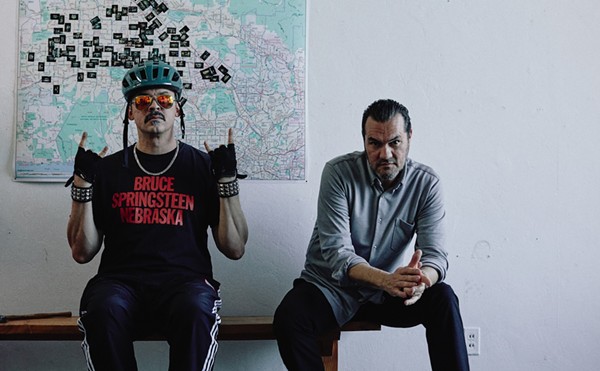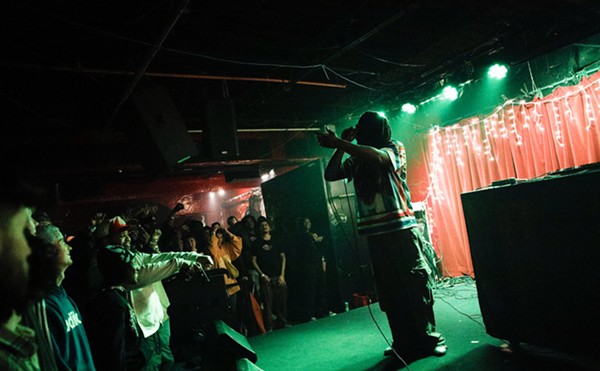In Advance of an Upcoming House of Blues Show, Descendents Drummer Talks About the Band's Pop-Punk Sensibilities
By Jeff Niesel on Wed, Nov 8, 2017 at 12:22 pm
[
{
"name": "Ad - NativeInline - Injected",
"component": "38482495",
"insertPoint": "3",
"requiredCountToDisplay": "5"
},{
"name": "Real 1 Player (r2) - Inline",
"component": "38482494",
"insertPoint": "2/3",
"requiredCountToDisplay": "9"
}
]
Descendents drummer Bill Stevenson grew up in a tiny coastal Southern California city in the 1970s. When he was in high school, punk rock wasn’t yet popular, so he had no trouble identifying the few fans of the music at Mira Costa High School.
“Our town was pretty small, and the very, very few people who were open-minded to punk rock all found each other quickly,” he says in a recent phone interview. “That was back in 1978. That extends to the Black Flag and the Descendents guys and then the Pennywise guys. It was in a small area about two square miles where all those bands are from. It was easy for us to find each other because there weren’t very many of us.”
Stevenson and original Descendents guitarist Frank Navetta first bonded over their mutual love of fishing. They’d eventually form Descendents with bassist Tony Lombardo. A couple of years later, singer Milo Aukerman would join the band. Despite a few breaks and lineup changes, the band has been going strong ever since; last year, it issued Hypercaffium Spazzinate, another terrific collection of melodic pop-punk songs. The band performs on Friday, Nov. 17, at House of Blues.
From the very beginning, the group infused its punk rock tunes with good melodies. Songs such as “Ride the Wild,” a tune with a plodding drum beat and mid-range vocals, and the snotty “It’s a Hectic World,” reflect the band’s pop sensiblities.
“I embraced a lot of music that Frank and David Nolte from [the power-pop band] the Last were showing me a lot of new music — everything from Ramones to Television,” says Stevenson. “Keith [Morris] from Black Flag and I worked at the tackle fishing store, and he would turn me into pre-punk like the Stooges or even something that would be considered New Wave like the first Cars album. I was doing that, but I was clutching onto my Black Sabbath records for dear life. If you’re a punk rocker, you shouldn’t be listening to Black Sabbath. I never considered myself a died-in-the-wool punker. I just liked rock music and didn’t give up my love for hard rock.”
Stevenson says that hardcore hadn’t yet made an impact, so the idea of screaming rather than singing was foreign to the band.
“I think there wasn’t much music in the world then that didn’t have any melody to it,” he says. “Their simple melodies and not sophisticated. They go along with the chords. Also, right in the same exact [SoCal] area, we had the Beach Boys. [Singer and songwriter] Brian Wilson went to El Camino College where I went. We were surrounded by melodic music. The last were a big influence on us when we were young kids.”
After Aukerman took a hiatus to go to college, Stevenson devoted more time to drumming with Black Flag.
“Descendents and Black Flag shared a practice room,” he says. “Since Robo was from Colombia, he would sometimes get deported, and I would have to play drums for Black Flag. That kept happening enough times to where the Black Flag guys were like, ‘You should join the band.’ I did. It was coincidental with Milo moving to San Diego [for college].”
Some 20 years ago, Stevenson moved to Colorado, where he built a studio, the Blasting Room, in 1994. Bands such as Rise Against, Lagwagon and MxPx have all recorded there as have a long list of underground acts.
While working at the Blasting Room has kept Stevenson plenty busy, he also found time to re-devote time to the Descendents after the band reconvened in 2010 after one of its infamous breaks.
“We don’t ever really break up,” he says. “We just stop doing stuff for a while and then start up again when we miss it. That’s what’s kept us going. We don’t force it to keep going all the time.”
He says the songwriting process for Hypercaffium Spazzinate followed the songwriting process of the band’s other albums.
“With Descendents, there have always been four songwriters,” he says. “Everybody in the band writes. It’s not an exact thing where each guy gets to write one quarter of the album, but that’s how we roll. Everybody gets to contribute a good deal of songwriting. That by definition means we don’t go into it with any kind of strategy. It’s 100 percent song-based. One guy wrote a song, and if we like it, we play it. It’s on that level. It’s no more sophisticated than that. We don’t have a concept. We’re not organized in that way. It’s just all about good songs for us.”
A certain sense of maturity runs through tracks such as the charging “Feel This” and “Human Being,” a song that addresses issues such as homelessness and apathy.
“I wonder if Paul McCartney could wish to have that same innocence when he wrote those first few albums worth of songs,” says Stevenson when asked about how the band has evolved. “He became a ‘better’ songwriter in the accepted definition of the word, but there’s something to be said for those youthful whimsical things. Speaking for myself, I look back on my early songs and I see trite, poorly written high school poetry. It seems to speak to people in a way that more sophisticated songs don’t. As I get turned out to more music, whether it’s Cole Porter or John Coltrane or the Beach Boys, I learn more ways to write, but I don’t know if I get better or worse. I think you just get different.”
Stevenson says he’s happy with the finished product.
“I think it’s pretty cool,” he says of Hypercaffium Spazinate. “I’m happy with the songs. It’s cool that people dig it. Speaking personally, I don’t care about some band’s ninth album. I just don’t care about. Unless it’s phenomenal, I wouldn’t give it a fair chance. That so many people have embraced it is very flattering. It’s hard to imagine.”
Stevenson has also recently had some health issues. Last year, he even had open heart surgery. He says playing the drums has actually proven to be therapeutic.
“I’m doing very well,” he says. “I don’t have any problems or surgeries on the horizon. I’m getting plenty of exercise and I have a good control on what I eat. I’m very active. We practice constantly, and I get a good amount of aerobics from drumming.”
The band’s had a huge influence on pop-punk. Guys like Blink-182’s Mark Hoppus and Foo Fighters’ Dave Grohl have publically said the band was an inspiration.
“It’s funny to hear that,” says Stevenson. “I don’t know what to think of it. To me, it’s just our little band that we started in our garage. The fact that it touched a bunch of people came as a surprise to all of us.”
Stevenson says the band has rehearsed 40 songs for the current tour. He says the set will include a mix of old and new material.
“We’re not so keen on pulling one out of the hat that we haven’t played,” he says. “The tempos are so quick, that might lead to some major mistakes. We just choose from those 40. It’s a good mixture of all the songs that people might want to hear from the records. It’s their show. I hope we play the ones they like, and I think we are.”
Descendents, Frank Iero and the Patience, Public Squares, 8 p.m. Friday, Nov. 17, House of Blues, 308 Euclid Ave., 216-523-2583. Tickets: $34-$45, houseofblues.com.
“Our town was pretty small, and the very, very few people who were open-minded to punk rock all found each other quickly,” he says in a recent phone interview. “That was back in 1978. That extends to the Black Flag and the Descendents guys and then the Pennywise guys. It was in a small area about two square miles where all those bands are from. It was easy for us to find each other because there weren’t very many of us.”
Stevenson and original Descendents guitarist Frank Navetta first bonded over their mutual love of fishing. They’d eventually form Descendents with bassist Tony Lombardo. A couple of years later, singer Milo Aukerman would join the band. Despite a few breaks and lineup changes, the band has been going strong ever since; last year, it issued Hypercaffium Spazzinate, another terrific collection of melodic pop-punk songs. The band performs on Friday, Nov. 17, at House of Blues.
From the very beginning, the group infused its punk rock tunes with good melodies. Songs such as “Ride the Wild,” a tune with a plodding drum beat and mid-range vocals, and the snotty “It’s a Hectic World,” reflect the band’s pop sensiblities.
“I embraced a lot of music that Frank and David Nolte from [the power-pop band] the Last were showing me a lot of new music — everything from Ramones to Television,” says Stevenson. “Keith [Morris] from Black Flag and I worked at the tackle fishing store, and he would turn me into pre-punk like the Stooges or even something that would be considered New Wave like the first Cars album. I was doing that, but I was clutching onto my Black Sabbath records for dear life. If you’re a punk rocker, you shouldn’t be listening to Black Sabbath. I never considered myself a died-in-the-wool punker. I just liked rock music and didn’t give up my love for hard rock.”
Stevenson says that hardcore hadn’t yet made an impact, so the idea of screaming rather than singing was foreign to the band.
“I think there wasn’t much music in the world then that didn’t have any melody to it,” he says. “Their simple melodies and not sophisticated. They go along with the chords. Also, right in the same exact [SoCal] area, we had the Beach Boys. [Singer and songwriter] Brian Wilson went to El Camino College where I went. We were surrounded by melodic music. The last were a big influence on us when we were young kids.”
After Aukerman took a hiatus to go to college, Stevenson devoted more time to drumming with Black Flag.
“Descendents and Black Flag shared a practice room,” he says. “Since Robo was from Colombia, he would sometimes get deported, and I would have to play drums for Black Flag. That kept happening enough times to where the Black Flag guys were like, ‘You should join the band.’ I did. It was coincidental with Milo moving to San Diego [for college].”
Some 20 years ago, Stevenson moved to Colorado, where he built a studio, the Blasting Room, in 1994. Bands such as Rise Against, Lagwagon and MxPx have all recorded there as have a long list of underground acts.
While working at the Blasting Room has kept Stevenson plenty busy, he also found time to re-devote time to the Descendents after the band reconvened in 2010 after one of its infamous breaks.
“We don’t ever really break up,” he says. “We just stop doing stuff for a while and then start up again when we miss it. That’s what’s kept us going. We don’t force it to keep going all the time.”
He says the songwriting process for Hypercaffium Spazzinate followed the songwriting process of the band’s other albums.
“With Descendents, there have always been four songwriters,” he says. “Everybody in the band writes. It’s not an exact thing where each guy gets to write one quarter of the album, but that’s how we roll. Everybody gets to contribute a good deal of songwriting. That by definition means we don’t go into it with any kind of strategy. It’s 100 percent song-based. One guy wrote a song, and if we like it, we play it. It’s on that level. It’s no more sophisticated than that. We don’t have a concept. We’re not organized in that way. It’s just all about good songs for us.”
A certain sense of maturity runs through tracks such as the charging “Feel This” and “Human Being,” a song that addresses issues such as homelessness and apathy.
“I wonder if Paul McCartney could wish to have that same innocence when he wrote those first few albums worth of songs,” says Stevenson when asked about how the band has evolved. “He became a ‘better’ songwriter in the accepted definition of the word, but there’s something to be said for those youthful whimsical things. Speaking for myself, I look back on my early songs and I see trite, poorly written high school poetry. It seems to speak to people in a way that more sophisticated songs don’t. As I get turned out to more music, whether it’s Cole Porter or John Coltrane or the Beach Boys, I learn more ways to write, but I don’t know if I get better or worse. I think you just get different.”
Stevenson says he’s happy with the finished product.
“I think it’s pretty cool,” he says of Hypercaffium Spazinate. “I’m happy with the songs. It’s cool that people dig it. Speaking personally, I don’t care about some band’s ninth album. I just don’t care about. Unless it’s phenomenal, I wouldn’t give it a fair chance. That so many people have embraced it is very flattering. It’s hard to imagine.”
Stevenson has also recently had some health issues. Last year, he even had open heart surgery. He says playing the drums has actually proven to be therapeutic.
“I’m doing very well,” he says. “I don’t have any problems or surgeries on the horizon. I’m getting plenty of exercise and I have a good control on what I eat. I’m very active. We practice constantly, and I get a good amount of aerobics from drumming.”
The band’s had a huge influence on pop-punk. Guys like Blink-182’s Mark Hoppus and Foo Fighters’ Dave Grohl have publically said the band was an inspiration.
“It’s funny to hear that,” says Stevenson. “I don’t know what to think of it. To me, it’s just our little band that we started in our garage. The fact that it touched a bunch of people came as a surprise to all of us.”
Stevenson says the band has rehearsed 40 songs for the current tour. He says the set will include a mix of old and new material.
“We’re not so keen on pulling one out of the hat that we haven’t played,” he says. “The tempos are so quick, that might lead to some major mistakes. We just choose from those 40. It’s a good mixture of all the songs that people might want to hear from the records. It’s their show. I hope we play the ones they like, and I think we are.”
Descendents, Frank Iero and the Patience, Public Squares, 8 p.m. Friday, Nov. 17, House of Blues, 308 Euclid Ave., 216-523-2583. Tickets: $34-$45, houseofblues.com.
SCENE Supporters make it possible to tell the Cleveland stories you won’t find elsewhere.
Become a supporter today.
About The Author
Jeff Niesel
Jeff has been covering the Cleveland music scene for more than 20 years now. And on a regular basis, he tries to talk to whatever big acts are coming through town, too. If you're in a band that he needs to hear, email him at [email protected].
Scroll to read more Music News articles
Newsletters
Join Cleveland Scene Newsletters
Subscribe now to get the latest news delivered right to your inbox.














